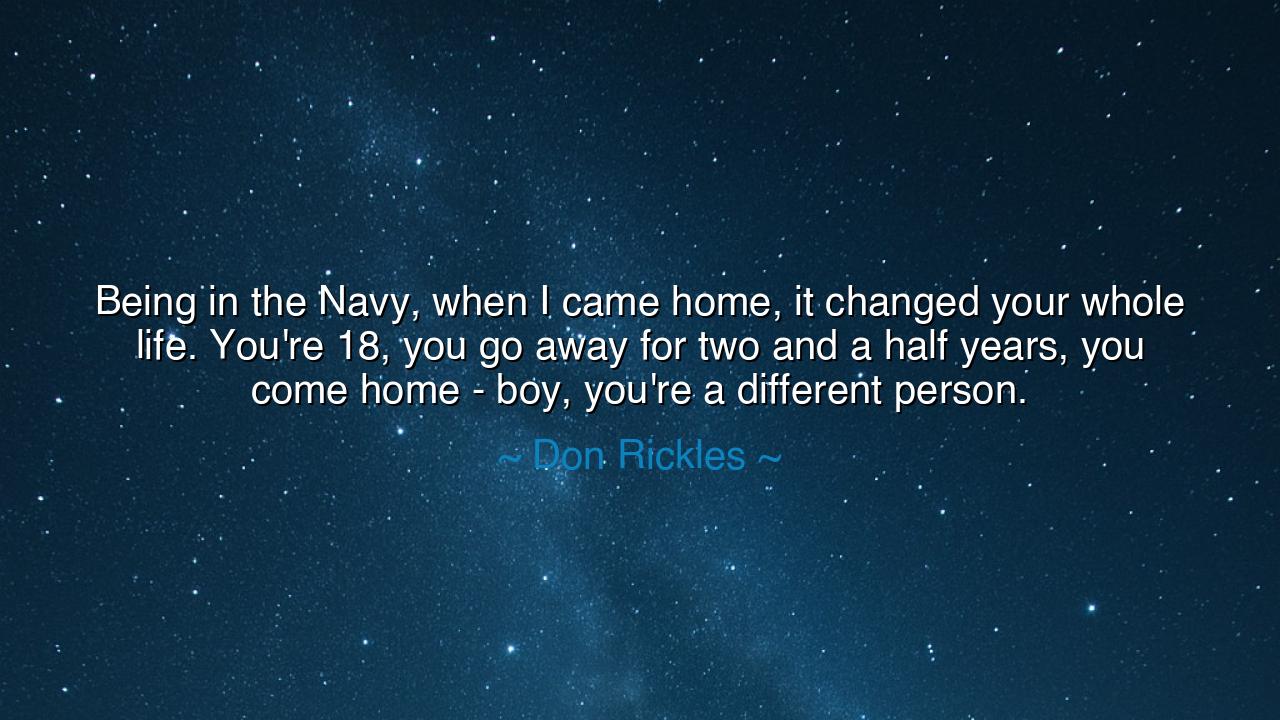
Being in the Navy, when I came home, it changed your whole life.
Being in the Navy, when I came home, it changed your whole life. You're 18, you go away for two and a half years, you come home - boy, you're a different person.






“Being in the Navy, when I came home, it changed your whole life. You’re 18, you go away for two and a half years, you come home — boy, you’re a different person.” Thus spoke Don Rickles, a man who wore both the uniform of a sailor and the mask of a comedian. His words, though uttered in his later years, echo with the gravity of youth transformed by service and time. Beneath their plainness lies the ancient truth of human growth — that war, distance, and duty are forges that temper the soul, reshaping the boy into a man, the innocent into the aware. In his reflection we hear not only the voice of one man, but the cry of every youth who has left home for the unknown and returned forever changed.
When Rickles speaks of the Navy, he speaks of more than ships and uniforms; he speaks of a passage — the journey from simplicity into the vast, unyielding world. At eighteen, a person stands at the threshold of life, still bound by the gentle illusions of youth: safety, permanence, the steady rhythm of home. But to be sent away — across oceans, into danger, into discipline — is to be stripped of that comfort. The sea, indifferent and endless, becomes both teacher and judge. It teaches endurance through isolation, humility through hardship, and unity through brotherhood. And when, after two and a half years, the sailor returns, it is not the same person who departed. The world has not changed — he has.
The ancients would have recognized this transformation as a sacred rite. For in every civilization, the youth becomes an adult not through time alone, but through trial. The Greeks sent their young to serve as warriors; the Romans to campaign in distant lands; even the philosophers, like Socrates, spoke of life’s battles as necessary for wisdom. To suffer and to serve — these were the gateways to understanding. Don Rickles’ time in the Navy was his initiation into that timeless order. It was there, amid the roar of engines and the salt of the sea, that he learned the fragility and the strength of manhood. It was there that he gained the perspective that later colored his humor — the sharp wit of one who had seen life not only as spectacle but as struggle.
His statement also speaks to a universal ache — the distance between who we were and who we become. When he says, “you come home — boy, you’re a different person,” he reveals a truth familiar to all who leave home for duty or destiny. The returning soul no longer fits perfectly into the world it left behind. The familiar streets, the faces, the comforts — they remain, but they feel altered, smaller somehow, because the heart has grown too vast to be contained by them. This is the paradox of growth: to gain wisdom is also to lose innocence. The hearth remains the same, but the one who sits by it no longer is.
History is filled with such transformations. Think of Odysseus, who, after ten years of war and ten more of wandering, at last returned to Ithaca. Though his home awaited him, he could not be the man who once left its shores. His mind was tempered by hardship, his heart weathered by memory. Like Rickles, he knew that the journey itself had changed him in ways the world could never see — only feel. Or consider the soldiers of the Great Wars, who departed as boys in uniform and returned as men bearing invisible scars. Their laughter was quieter, their gaze deeper, for they had seen both the fragility and resilience of life.
Don Rickles, though known to the world for laughter, carried this same quiet gravity. The comedian’s smile often hides the philosopher’s wisdom, and in these words, that wisdom speaks. He reminds us that growth does not come gently; it arrives through separation, challenge, and reflection. To leave home and return is one of life’s oldest transformations. It is the movement of the soul from innocence to understanding — a journey each of us must take, in our own way, whether through war, work, or the inner battles of life itself.
So, my listener, take from this the lesson of Don Rickles’ humility: that to live fully, one must first be tested. The comfort of home teaches love; the distance from it teaches gratitude. Do not fear change, for it is the vessel by which wisdom enters the heart. When you are sent into life’s deep waters — whether through struggle, loss, or the pursuit of purpose — remember that each wave is shaping you. And when you return, as Rickles did, to the shores of your beginning, you will look upon them with new eyes. For though the world will seem the same, you will have become the sailor who knows its depths — forever changed, yet forever grateful for the sea that made you so.






AAdministratorAdministrator
Welcome, honored guests. Please leave a comment, we will respond soon